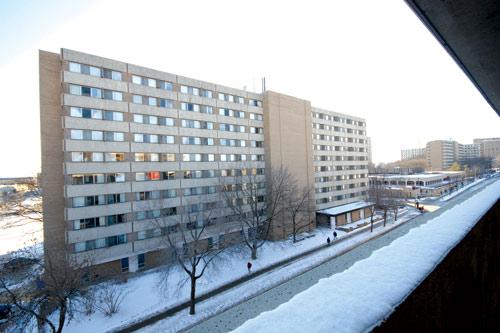As Madison hospitals face the possibility of reaching capacity with the growing number of COVID-19 cases, University of Wisconsin residence halls are being considered as a viable option for emergency overflow space.
In a Facebook Live Q&A video put out by University Housing, UW Housing Director Jeff Novak addressed questions surrounding students moving out of the residence halls. One of the main reasons he cited for a quick and efficient moveout was the growing possibility for residence halls to be used as overflow space for COVID-19 patients in Dane County.
Students must be out of the dorms for this to even be a possibility, Novak said.
“We want to be able to help,” Novak said in the Facebook live stream. “And you all helping through this process [to] get out of our residence halls could make a big difference later if this becomes more of a danger to our community than it already is.”
UW Housing spokesperson Brendon Dybdahl wrote in an email to the Herald that currently, this is only a hypothetical situation. Dybdahl wrote it is something other states and cities are considering, and UW is conscious of the idea in case the pandemic situation worsens.
Though nothing is in the works at this time, Dybdahl explained, after students are moved out of the residence halls in the next month, UW will evaluate how many students have been granted exceptions to stay on campus and how many other students still need to retrieve their belongings from their room.
Depending on the numbers, Dybdahl said UW may need to consolidate remaining residents into a few buildings to maintain better service for them, potentially freeing up some buildings if UW needed to accommodate hospital overflow in Dane County.
“Much more planning would need to happen to work out the details of a complex idea like this,” Dybdahl wrote in an email. “We’re not at that point yet, but our campus will respond to this ever-changing pandemic situation in whatever way is best for the health and welfare of our community.”
According to a published analysis by the Harvard Global Health Institute detailing hospital capacities across the nation, many communities will lack the available space to serve all infected COVID-19 patients requiring intensive care. The analysis’s model forecasted about one-fifth of infected adults will need access to medical care and will need to be hospitalized.
According to Madison.com, even if residents adhere to social distancing policies, the Harvard analysis predicts about 20 percent of the adult population in the Madison area may become infected in the next 18 months.
The analysis indicates hospitals in the Madison area would be operating at just under 100 percent capacity, making overflow in Madison a real possibility in the months to come.


